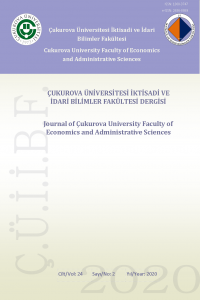Gelişmekte Olan Ülkelerde Yaygın Eğitimin Yoksulluğu Azaltma Üzerindeki Etkisi
Yoksulluk, yaygın eğitim, Gelişmekte Olan Ülkeler
___
- Berg, S. V. (2008), Poverty and Education, Education Policy Series, 1-8 Coombs, P.H. & Ahmed, M. (1974). ATTACKING RURAL POVERTY, How Non Formal Education Can Help, USA, 3-20, 143-193
- Çokgezen, M. & Terzi, N. (2008). Türkiye’de Devletin Eğitime Müdahalesinin Yeterli Gerekçesi Var Mı? s.3
- Etllng, A. (1993). What Is Non Formal Education?, Journal of Agriculture Education, USA, 72-76
- Field, F. (1983). The Minimum Wage Policy Studies İnstitute, London, 50-51
- Fordham, P.E. (1993) ’Informal, Non-Formal abd Formal Education Programmes’ in YMCA George Williams College ICE301 Lifelong Learning Unit 2, London: YMCA George Williams College, s.2
- Gulati, S. (2008) Technology-Enhanced Learning in Developing Nations: A Review, İnternational Review of Research in Open and Distance Learning, Vol.9, No.1, s. 11-12
- Khan, H. & Willimas, J. B. (2006). Poverty Alleviation Through Access to Education: Can E-Learning Deliver?, U21 Global Working Paper, 1-14
- Kumar, S. & Ahmad, S. Meaning, Aims and Process of Education, 1-60
- McQuaide, S. (2009). Making Education Equitable in Rural China through Distance Learning, International Review of Research in Open and Distance Learning, 1-21
- Önder, H. & Şenses, F. (2005) Türkiye’de Yoksulluk ve Yoksulluk Düşüncesi, 4
- Siaciawena, R. (2000). Case Studies of Non Formal Education by Distance Education and Open Learning, Chapter 5, Uganda: Distance Education of the Ministry of Health, UK, 92-113
- Veen, R.V.D. & Preece, J. (2005). Poverty Reducation and Adult Education: Beyond Basic Education, International Journal of Lifelong Education, 381-391
- World Bank. (2010). Republic of Ghana, Second Phase of the Functional Literacy Project, Project Performance Report, 4-37
- World Bank. (1999). National Functional Literacy Program
- World Bank. (2014). Pakistan-Emergency Job Training for Vulnerable Youth, Implementation Completion and Result Report
- World Bank. (2008). The People of Bangladesh for A Post Literacy and Continuing Education for Human Development Project
- World Bank, World Development Indicator, www.worldbank.org , erişim tarihi 20.02.2015
- ISSN: 1300-3747
- Başlangıç: 1987
- Yayıncı: Çukurova Üniversitesi
Gelişmekte Olan Ülkelerde Yaygın Eğitimin Yoksulluğu Azaltma Üzerindeki Etkisi
Balassa-Samuelson Hipotezinin İçsel Aktarım Mekanizmasının Türkiye Ekonomisi İçin Test Edilmesi
Doğrudan Yabancı Sermaye Yatırım İkliminin Oluşturulmasını Belirleyen Faktörler
Ülke Riski Bileşenlerinin Bankacılık ve Reel Sektör Üzerine Etkileri: Türkiye Örneği, 1993-2015
Recep KÖK, Ramazan EKİNCİ, A. Elif Ay YALÇINKAYA
Türkiye Turizm Talebini Açıklamaya Yönelik Bir Panel Çekim Modeli Analizi
Makro Ekonomik ve Politik İstikrarsızlığın Ekonomik Performans Üzerine Etkisi: Latin Amerika Örneği
Kargo Şirketi Seçimine Yönelik Kriterlerin Belirlenmesinde Türkiye Genelinde Bir Saha Araştırması
